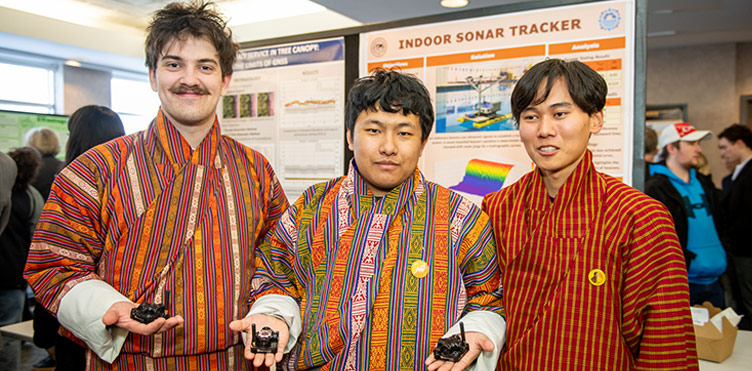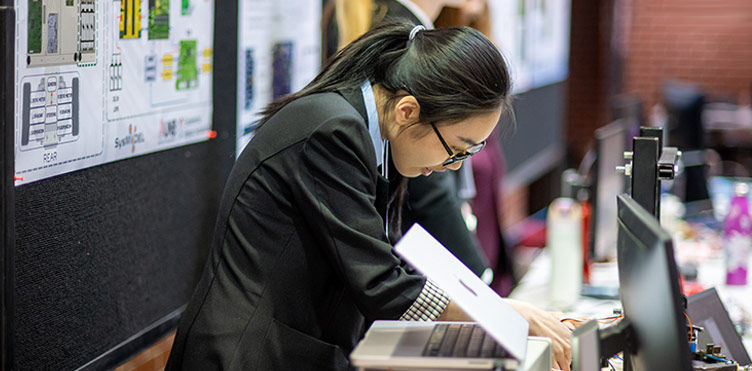Capstone design projects

The opportunity
The Senior Design Capstone Program at UNB Engineering offers experiential learning and several opportunities for Strategic Partners to engage with senior engineering students more deeply as:
- clients for student design projects,
- mentors for projects.
Be a partner
Partnership offers multiple benefits for your company.
- Develop your talent pipeline. Partnering offers an organic approach to get to know students.
- Build awareness for the company with students, faculty, and staff at UNB Engineering.
- Encourage employees to engage with students as they partner to share the latest design principles.
- Explore solutions to organizational challenges together with student projects.
This is how it works
Students take a design course for a full year, fall and winter terms. It is available to senior students in chemical, electrical, computer, software, mechanical, mechatronics, civil, and geological engineering disciplines.
Students work in teams of three to five members. Together they do a discipline specific or interdisciplinary project to design a structure, system, process, or new product.
What they deliver
Students are responsible for specific deliverables throughout the academic year from September to April. These include:
- oral progress and final report presentations,
- final report with drawings and/or process diagrams when applicable,
- prototype if applicable and funding is available.
Solutions involve the use of modern engineering tools and design methods while meeting a broad range of constraints including health and safety, sustainable development, and environmental stewardship.
Your role as a partner

As a project client:
- Strategic partners are invited to identify a problem, project, or idea for student teams to address during ENGG 4000, CE 4993, or GE 4993. Student projects have the potential to bring value to the company by addressing a problem or project that has been waiting on the back burner.
- Project examples include mechanical, mechatronics, and electrical projects that usually involve the design, construction, and testing of a prototype while chemical projects normally involve a digital simulation of proposed processes or systems. Interdisciplinary projects may involve a combination of builds and simulation. Projects may also be multi-year over the course of several academic years running from September to May. These would be broken down into phases that can be completed in yearly segments.
- There is no charge to the client for the students' work. However, the cost of materials to complete these projects are often covered by the client, especially when a prototype is produced.
- Clients are expected to meet with students a minimum of four times according to this suggested schedule:
- September - introduction which may be followed by a site visit if applicable,
- October - design review,
- February - design review,
- April - project presentation at the Senior Engineering Design Symposium and additional potential site visit.
- Student access to a client is always vetted by the instructor.
As a mentor
- Industry mentors work with student groups one-on-one to help guide their design projects.
- Mentors do not need to work for the same organization as the students' industry client.
- Time commitment: weekly one-hour meetings with students and evaluation of progress reports submitted by students every few weeks.
- Mentors provide written feedback on the progress reports submitted by students.
- Complete group and individual evaluation forms associated with graduate attribute evaluations for program accreditation.
- Financial remuneration is available at $50/hour for mentoring with a maximum of 50 hours per academic year.
While in-person interactions are preferred, meetings may take place in-person or via MS Teams. Site visits may be held when feasible.
Process and timeline for 2025-2026 academic year
For the project client
- May 30: If partners require a review and any changes to the NDA.
Partners submit projects by May 30 through the shared form: project form. - June 30: If partners do not require a review or any changes to the NDA.
Partners submit projects by June 30 through the shared form: project form. - June 1 to June 16: Leads review submissions and identify projects that align best with the curriculum. They mark submissions on the shared form as approved or not. The Partnerships Office notifies partners if their project will move forward to the student selection phase. An NDA is sent along for review and signature.
- June 17 to July 16: Partners return signed NDAs to Partnerships Office or return to UNB with proposed edits.
- July 17 to August 29: Edits are reviewed and NDAs are signed. All NDAs must be finalized and signed by prospective project partners prior to August 29. If a project partner has not signed an NDA by this date, the project will not be considered for fall placement. The Partnerships Office files the NDAs and shares with Leads for student signatures.
- Sept. 4 to Sept. 15: Students form teams and select their preferred projects. Projects are accepted and/or assigned. Clients meet with teams.
- Sept.16 to Oct. 1: Leads collect NDA signatures from students. Leads file NDAs and share with Engineering Partnerships Office.
- Oct. 2 to Oct. 15: Partnerships Office files all projects and signed NDAs and sends reports to partners.
For a mentor
- You can share your interest in serving as an industry mentor any time.
- Mentors are assigned to student groups once projects have been selected in September.
Speak with anyone in our office about your project or intention to be a mentor. Email: Engg.partnerships@unb.ca.
Receive the latest news and stay connected with us. Sign up for our Partners Newsletter issued in fall, winter, and spring.
